Are you considering incorporating cannabis into your nightly routine? If so, you’re not alone. Many people turn to cannabis, also called marijuana or weed, to help with sleep.
Research suggests that cannabis may be beneficial in reducing insomnia and promoting longer, better-quality sleep. At the very least, cannabis seems to offer a natural alternative to prescription sleeping medications that are known to be addictive and come with a range of side effects.
However, there's ongoing debate and uncertainty around the impact of prolonged cannabis use on sleep quality and overall health, and all users must be well informed.
Join us as we explore the complex relationship between cannabis and sleep. We hope to shed some light on the current state of research, point out limitations in our collective knowledge, and detail the potential benefits and associated risks of relying on cannabis for sleep.
At a glance:
- Does Cannabis Help with Sleep?
- How Does Cannabis Affect Various Sleep Disorders?
- How Does Cannabis Work as a Sleep Aid?
- What Is the Best Type of Cannabis Strain for Sleep?
- What Are Different Types of Cannabis Products for Sleep?
- What Is the Best Time of Day to Take Cannabis for Sleep?
- What Are the Differences Between Cannabis and Other Natural Sleep Aid Alternatives?
- Is Using Cannabis for Sleep Safe for You?
- What Are the Side Effects and Risks of Using Cannabis for Sleep?
- Can Cannabis Suppress Dreams?
- Can Cannabis Cause Insomnia?
- Choose CBD Sleep Products
Does Cannabis Help with Sleep?
It’s not uncommon for people to use cannabis to self-treat insomnia and sleep-related issues such as chronic pain and anxiety.
Many users find that cannabis helps them wind down and feel sleepy, but what does the research say about this? Several studies show that cannabis has a positive effect on sleep, suggesting that cannabis can improve sleep quality, reduce sleep disturbances, and help people fall asleep more quickly.
While this is promising, some research also suggests that long-term cannabis use may disrupt sleep by altering your “sleep architecture” — the natural cycle of sleep stages you experience each night.
Ultimately, whether cannabis is good or bad for sleep might depend on the tetrahydrocannabinol (THC) content of the cannabis.
THC, the primary psychoactive compound in cannabis, appears to reduce the amount of time you spend in REM sleep, the sleep stage where you do most of your dreaming. Modern cannabis plants can contain very high concentrations of THC, as much as 15-25%, which may explain the sleep issues some chronic users experience.
This heavy THC load in marijuana is why many sleep-focused cannabis products are made from hemp. Hemp is a particular type of cannabis containing less than 0.3% THC. Unlike psychoactive cannabis (aka marijuana), hemp is cultivated to maximize the wellness benefits of cannabidiol (CBD).
For example, our FOCL CBD sleep gummies are made with hemp-derived CBD. This formulation ensures they are federally legal and contain little to no THC, promoting a better sleep experience for users.
Beyond CBD and trace amounts of THC, hemp is packed with other sleep-supporting cannabinoids like CBN, making this type of cannabis ideal for those seeking restful sleep without the sleep-disrupting effects of THC.
Check out our detailed article exploring the use of CBD for sleep to learn more.
How Does Cannabis Affect Various Sleep Disorders?
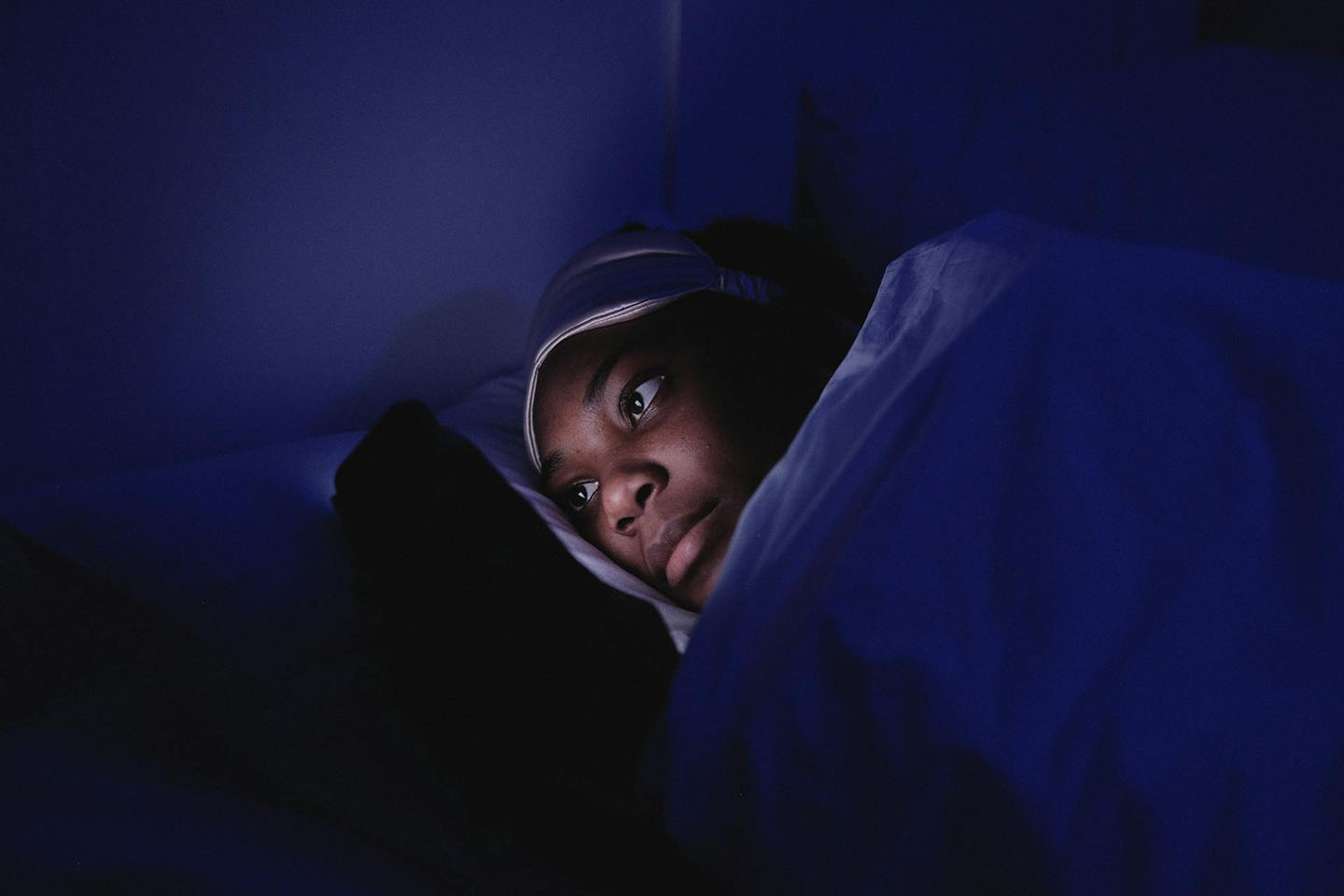
Cannabis use has been explored in the treatment of several sleep disorders, including insomnia, sleep apnea, and restless leg syndrome.
A 2022 study showed promising results when treating insomnia with cannabis. In the survey, 71% of patients reported improvements in their sleep, and 39% could reduce or discontinue their use of prescription medications.
Most of the patients suffered from anxiety disorders and reported feeling more relaxed with cannabis, hinting at its potential for reducing anxiety-related insomnia.
Cannabis also shows promise in relieving restless legs syndrome (RLS). Many patients report total relief from RLS with cannabis use, suggesting that cannabis could offer an alternative treatment option for patients experiencing side effects from prescription medications.
Research on cannabis for obstructive sleep apnea (OSA) is currently limited to animal studies and clinical trials using synthetic cannabis extract. However, this early research shows that synthetic cannabis may improve breathing stability in people with OSA.
Until more research is done in this area, The American Academy of Sleep Medicine (AASM) currently recommends against using medical cannabis for the treatment of sleep apnea.
Research on the use of cannabis for sleep disorders is still in its early stages. There's a lot more work to be done in this area before experts are comfortable recommending cannabis as a treatment method, but the preliminary evidence suggests that cannabis may be effective for treating and managing a range of sleep problems.
How Does Cannabis Work as a Sleep Aid?
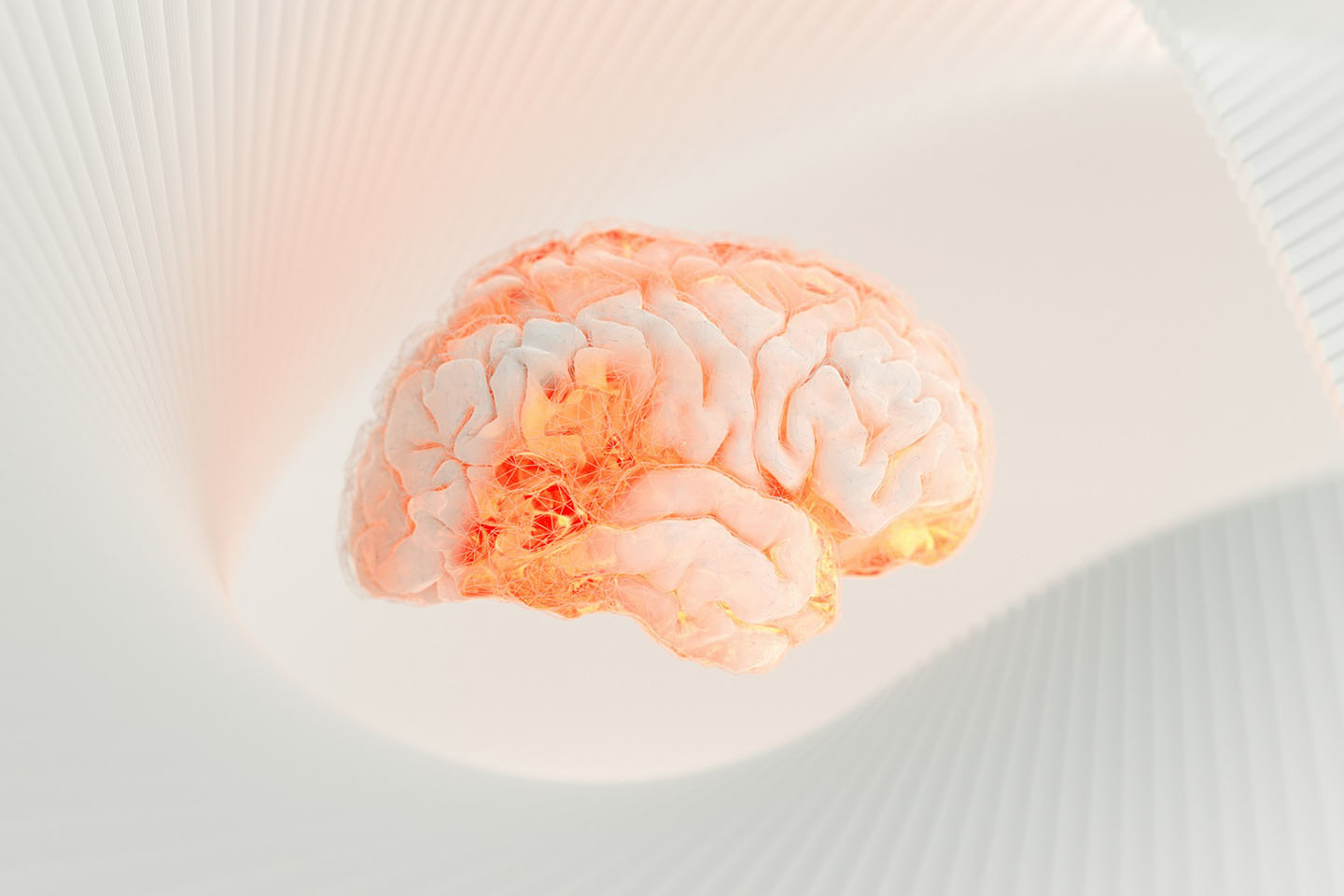
The cannabis plant contains over 100 different cannabinoids — compounds that interact with receptors in the nervous system to influence various biological processes, including the sleep-wake cycle.
THC and CBD are two of the most abundant cannabinoids in cannabis. When these compounds bind to receptors in the body, they release adenosine, a chemical that fuels our desire to sleep. These compounds also light up the brain’s reward system, relieve anxiety, and moderate pain, all indirectly supporting relaxation and improving sleep quality.
Here’s the twist: THC and CBD don’t always play nicely when it comes to sleep.
Low doses of THC can act as a sleep aid, helping you fall asleep faster and increasing your total sleep time. However, higher doses of THC tend to have the opposite effect, becoming stimulating and disrupting your sleep.
CBD works differently. Low doses can be mildly stimulating, while higher doses promote relaxation and sleepiness. Because of these opposing effects, low doses of THC paired with high doses of CBD are ideal for sleep.
The various other compounds in cannabis also play a role in sleep. These compounds seem to work together in a synergistic relationship called the “entourage effect,” boosting the therapeutic properties of the leading players, THC and CBD.
What Is the Best Type of Cannabis Strain for Sleep?
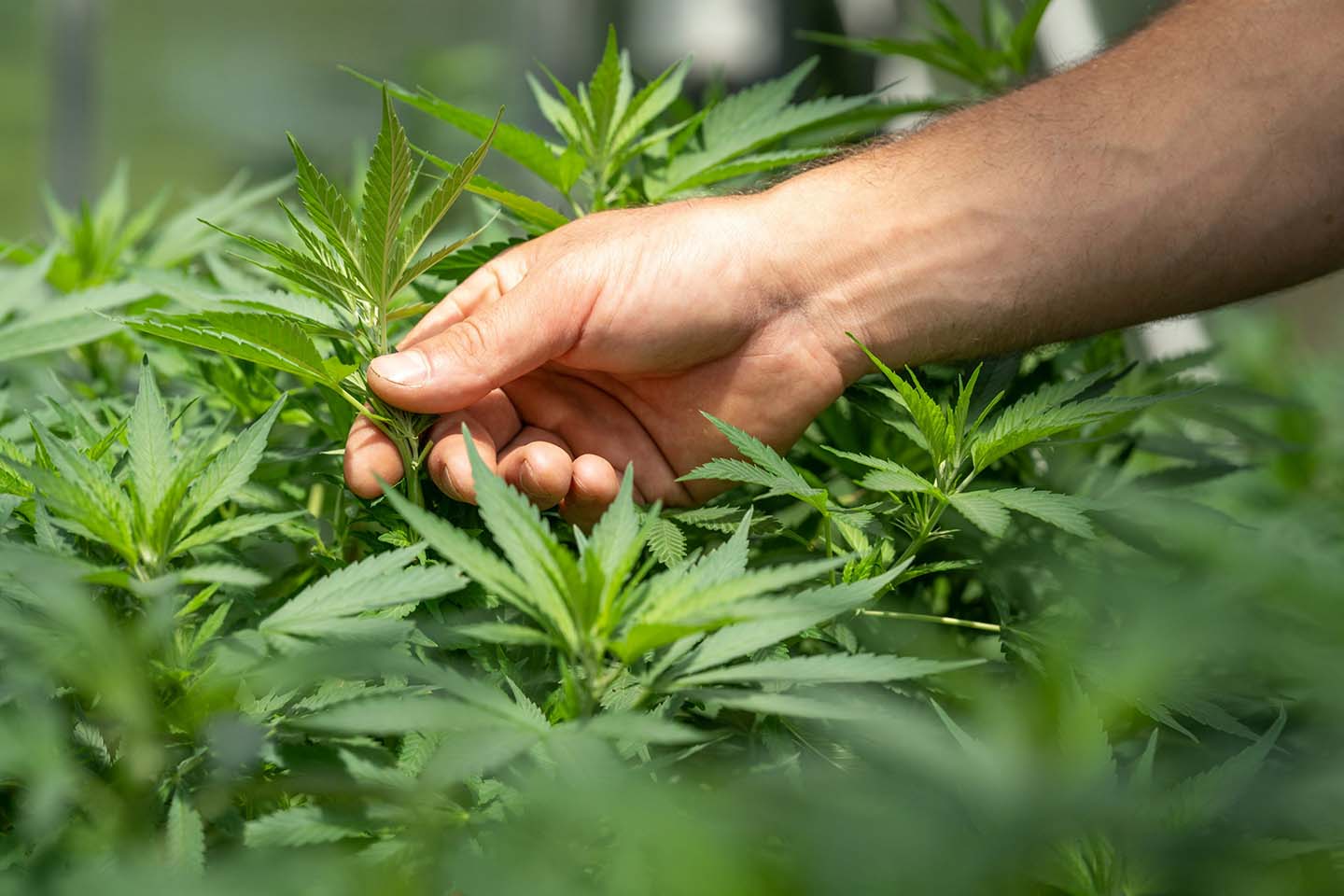
Cannabis strains are often classified into two main categories: Sativa and Indica. Sativa is thought to be more stimulating, while India is said to be sedating and, therefore, better for sleep. However, this simple classification has become a heavy topic of debate.
Extensive breeding of cannabis plants has blurred the lines between these traditional categories. Over 700 strains of cannabis exist today!
The unique terpene profile of each cannabis strain is what drives the variation in their effects. Terpenes are aromatic compounds found in cannabis that affect the nervous system. For example, myrcene and linalool are terpenes associated with relaxation, sedation, and sleep support, while limonene is a terpene known for its uplifting properties.
Whether a particular cannabis strain is classified as sativa, indica, or a hybrid of the two indicates the effects associated with the strain. The indica classification can help you identify strains likely to contain higher concentrations of calming terpenes that can support your sleep.
What Are Different Types of Cannabis Products for Sleep?
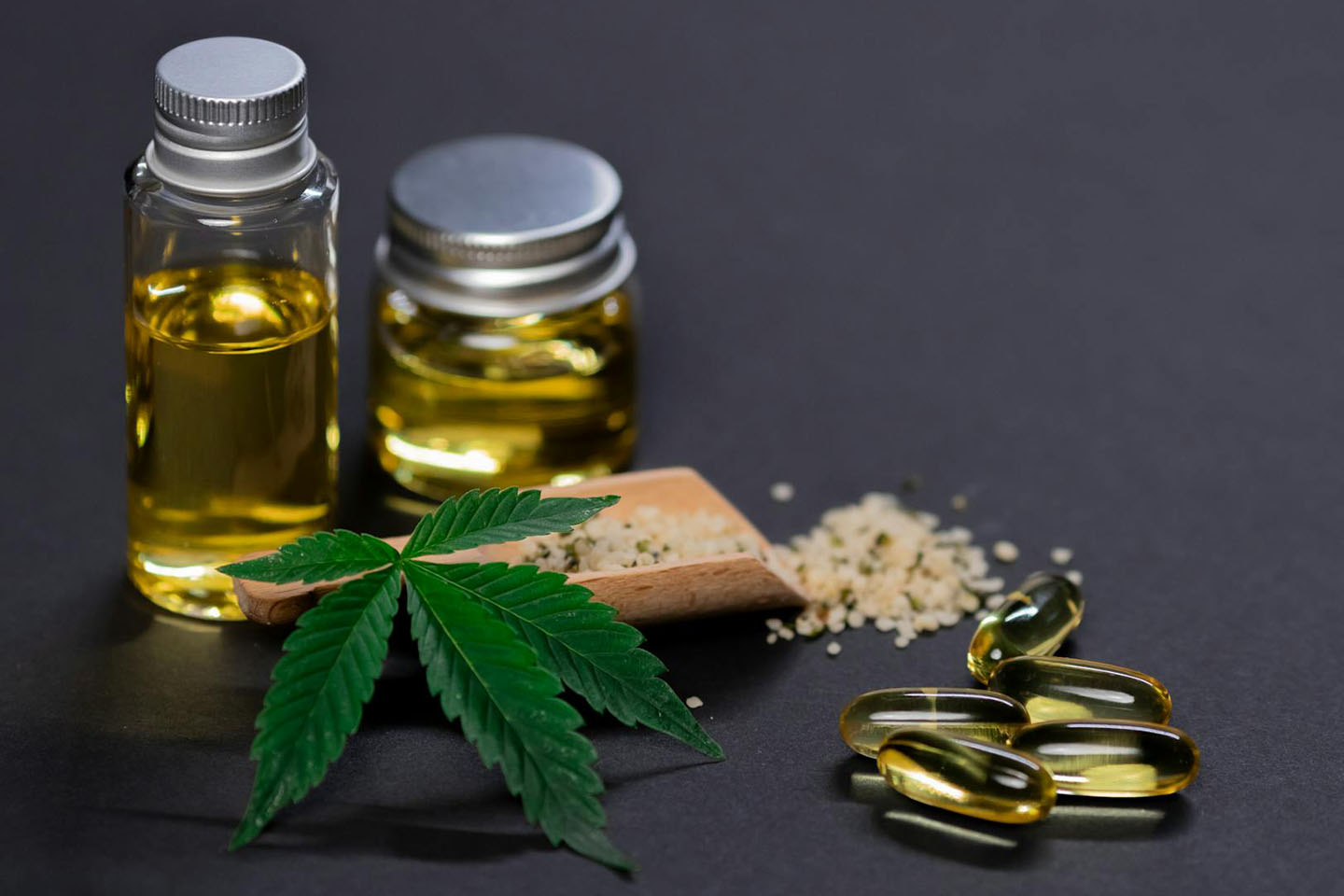
Some of the most common cannabis products for sleep include oils, edibles, and topicals.
Cannabis oils are typically taken under the tongue, and are rapidly absorbed into the bloodstream. Edibles, like gummies and baked goods, are digested and absorbed more slowly. Topical creams and balms support sleep by providing localized relief from pain.
Many people also smoke or vaporize cannabis. With these consumption methods, effects are felt within minutes but often do not last as long as other products.
Keep in mind that only hemp-based products are legal at the federal level. As a result, most commercially available cannabis products are made with CBD extracts that contain little to no THC. These are widely available online and in-store.
When shopping for sleep-focused CBD products, pay attention to the type of extract used. There are three main types of hemp extract. These are:
Are you interested in trying cannabis to help with sleep? FOCL offers a variety of full-spectrum and broad-spectrum CBD gummies and oils designed for sleep, each delivering a potent dose of CBD along with CBN, another cannabinoid known for its sedating effects.
Our FOCL sleep products also contain additional calming ingredients to enhance your sleep further. For example, our Deep Sleep gummies include L-theanine and a touch of melatonin for enhanced sleep support.
Explore our line of sleep products to find the best cannabis product for sleep tailored to your specific sleep needs.
What Is the Best Time of Day to Take Cannabis for Sleep?
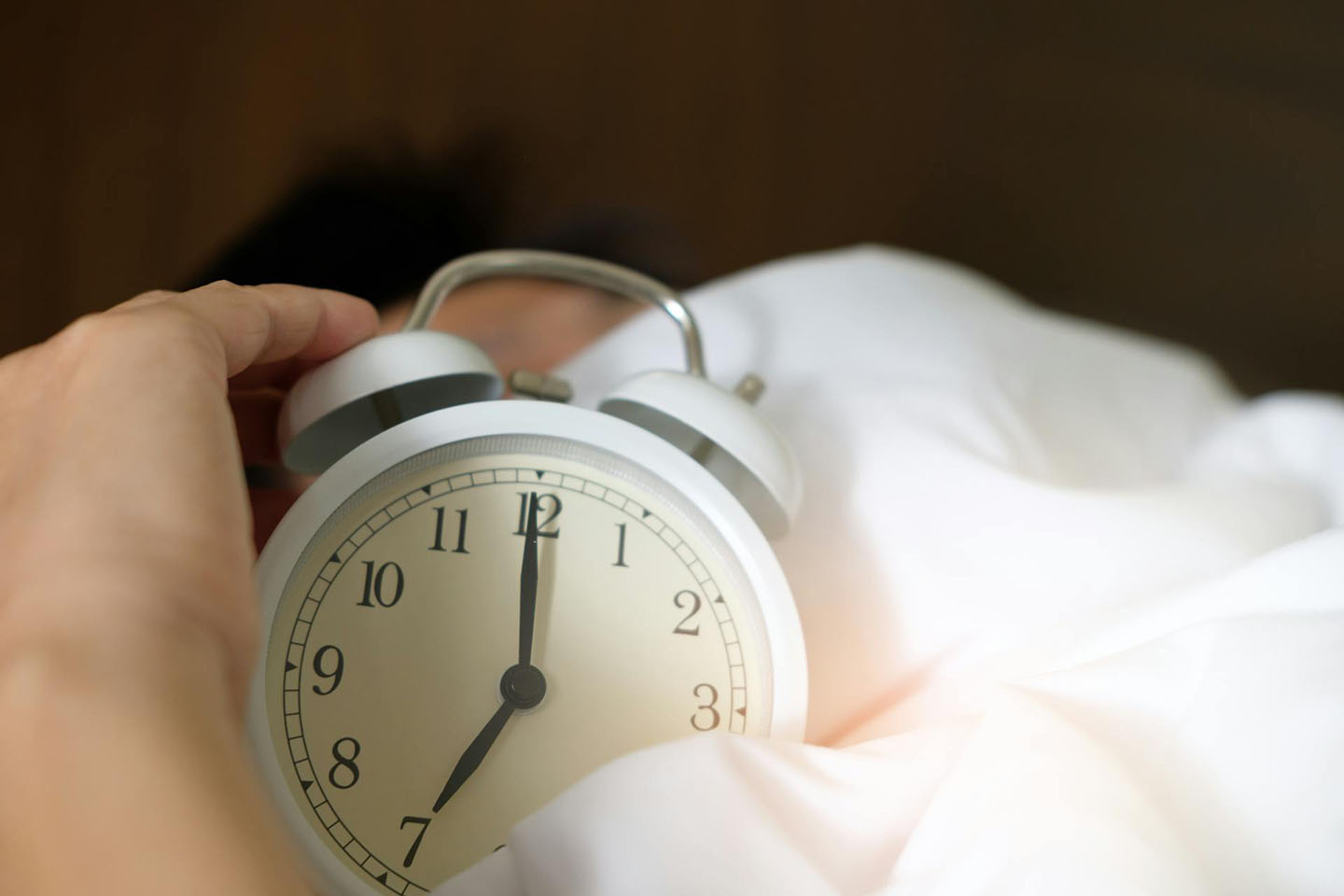
In general, we recommend consuming cannabis around 30-60 minutes before bed to allow time for the compounds to work their magic.
The perfect time to take cannabis for sleep depends ultimately on the specific cannabis product and method of consumption. For example, if you’re using cannabis oil, you’ll want to take the drops under your tongue around 30 minutes before bed — these will absorb faster than edibles.
With edibles, it can take up to two hours for the CBD and THC to kick in, so try to consume edible products at least an hour before bedtime.
What Are the Differences Between Cannabis and Other Natural Sleep Aid Alternatives?
Cannabis differs from other natural sleep aids in their mechanisms of action. As we mentioned earlier, cannabis compounds interact with special cannabinoid receptors in your nervous system to promote a sense of relaxation.
Besides cannabis, there are plenty of other natural sleep aids that can help you relax in the evening and improve your sleep quality without the side effects of prescription sleeping medication.
Each of these alternative sleep aids affects the body differently. For example:
Many of these natural sleep aids pair nicely with cannabis. This synergy is why you’ll often find soothing herbs, sleep hormones, and other sleep-supporting ingredients in CBD sleep products.
Is Using Cannabis for Sleep Safe for You?

Cannabis is generally safe when used for sleep on a short-term basis, with a few exceptions for certain individuals. For example, health experts recommend against using cannabis if you are pregnant or breastfeeding.
Drug interactions are also a risk when using cannabis. Cannabis can interact with certain medications, including sedatives, benzodiazepines, and antidepressants, so it’s best to talk to your doctor before using cannabis if you take any prescriptions.
What Are the Side Effects and Risks of Using Cannabis for Sleep?
One of the main safety issues with cannabis is the risk of impairment from strains with high levels of THC. While THC often produces a general sense of well-being and relaxation, the psychoactive compound can also slow your reaction time and impair your ability to make decisions, which can make certain activities unsafe — such as driving.
It’s also important to note that the residual effects of cannabis can linger into the next day, affecting your cognitive function, daytime alertness, and overall well-being.
Some other side effects from short-term cannabis use include:
- Dry mouth, commonly referred to as “cottonmouth.”
- Increased heart rate
- Anxiety and paranoia
- Dizziness and disorientation
- Nausea and stomach upset — mainly limited to edible products.
The safety of chronic cannabis use is also questionable. Users can develop tolerance through long-term use, which can cause cannabis withdrawal symptoms such as anxiety and loss of appetite.
There is also evidence that withdrawing from heavy, chronic cannabis use is associated with trouble falling asleep, reductions in slow-wave sleep, and changes to REM sleep patterns. Some research suggests that long-term cannabis use may also cause cognitive deficits.
Notably, products with higher THC concentrations are much more likely to cause the aforementioned long-term issues. CBD itself is not known to cause withdrawal symptoms. Studies show that CBD can improve cognitive performance and protect against neurological damage.
CBD sleep gummies are an excellent choice for sleep and come with far fewer side effects than THC-heavy cannabis products. Check out our article on CBD sleep gummy side effects to learn how to ensure safety when trying CBD for sleep.
Can Cannabis Suppress Dreams?

Many people who use cannabis report not dreaming or not remembering their dreams. This effect might occur because THC impacts short-term memory. Evidence also suggests that THC reduces the amount of time people spend in REM sleep when most dreams occur.
The research on this topic is mixed. Some studies show that cannabis users have fewer dreams, while others report no difference in dreaming between people who use cannabis and those who do not. In fact, some studies find that cannabis users have more intense or bizarre dreams.
Still, clinical data shows that cannabis can improve symptoms of posttraumatic stress disorder (PTSD) and reduce nightmares. Cannabis also appears to relieve symptoms of REM sleep behavior disorder, where people physically act out their dreams while sleeping.
Can Cannabis Cause Insomnia?
Despite cannabis offering support for insomnia, it can contribute to insomnia in some cases. As we mentioned, THC can disrupt your sleep architecture by changing your regular sleep cycle and causing sleep disturbances, especially with long-term use.
Cannabis low in CBD and high in THC is more likely to cause insomnia, as this combination tends to be stimulating rather than relaxing. Withdrawing from chronic cannabis use can also trigger insomnia for several days or weeks.
The good news is that CBD alone does not cause insomnia — many people find that CBD products are beneficial for managing insomnia and other sleep disorders.
Choose CBD Sleep Products
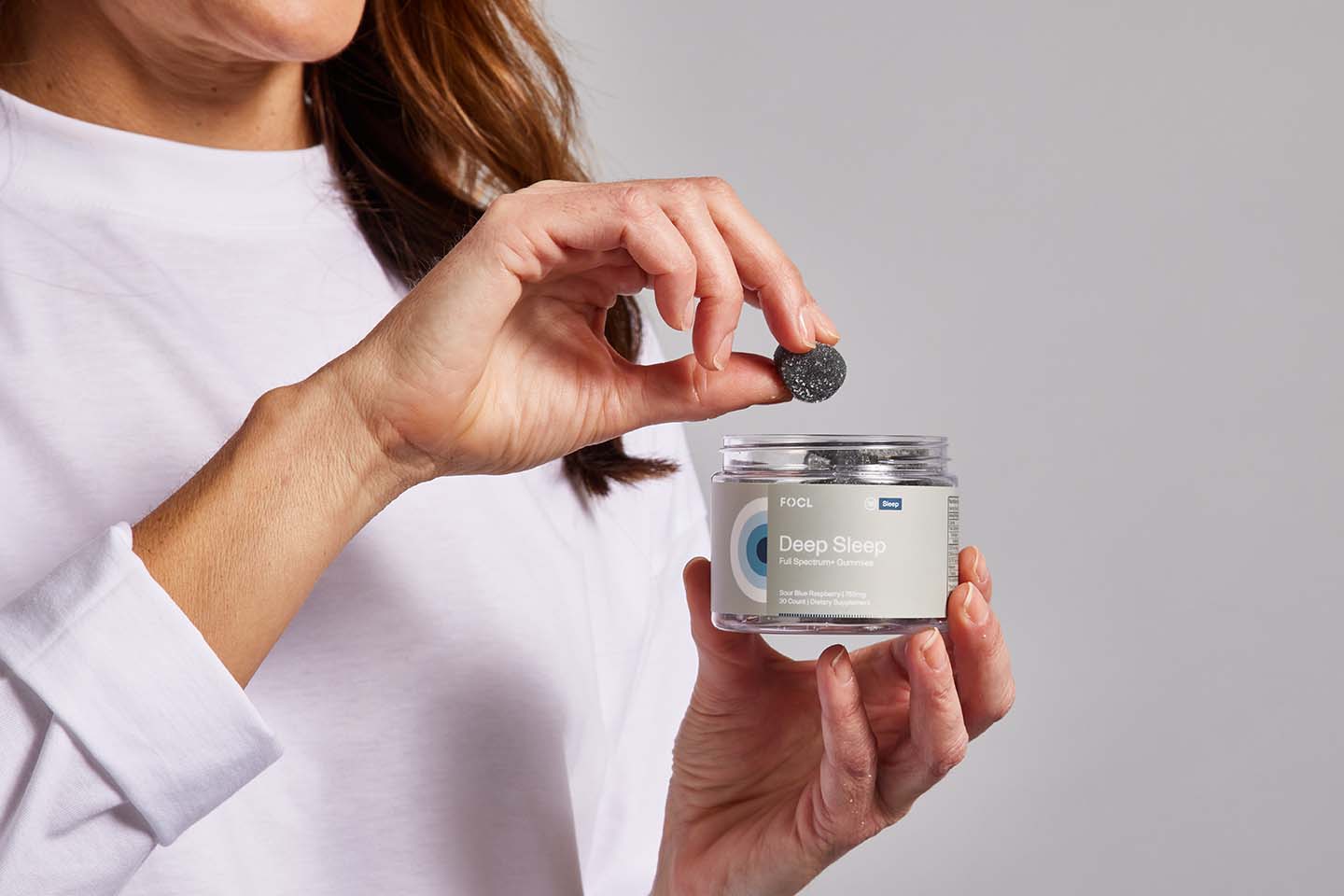
The relationship between cannabis and sleep is a complex landscape of research revealing various benefits and risks. With many studies suggesting promising outcomes for people seeking better sleep through cannabis use, it’s essential to navigate your options with caution and an awareness of your individual health needs.
If you’re looking for effective sleep-enhancing edibles, consider trying calm gummies for better rest. Gummies provide an easy and tasty avenue for enjoying the sleep-promoting benefits of cannabis.
Better yet, opt for CBD products derived from hemp to avoid unwanted side effects from high THC levels. FOCL offers a range of high-quality CBD products formulated specifically for sleep, crafted with full-spectrum and broad-spectrum hemp extracts for the ultimate refreshing slumber.
FOCL even provides a 60-day money-back period so you can experience the benefits of cannabis first-hand and rest assured that your satisfaction is guaranteed.




